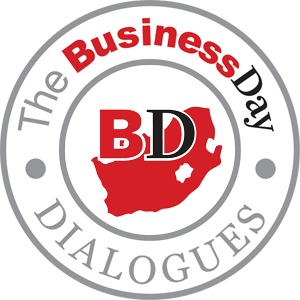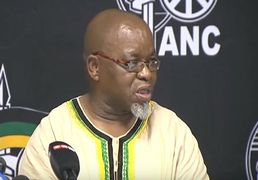SOUTH Africa is losing the perception battle because unfounded myths about the economy and the state of ownership in the country are allowed to circulate, said Economist.co.za chief economist Mike Schussler on Wednesday.
The absence of credible information and data to inform the political debate would exacerbate the situation leading up to the elections next month, he said at a breakfast meeting of business rights watchdog AfriSake in Pretoria.
Mr Schussler repeated his statement that the biggest inequality in South Africa was not between the top and bottom earners in the specific sectors in the economy, but between those who had jobs and those who did not.
He said the state as employer had been growing annually, with 13.5% of the gross domestic product (GDP) being spent on the salaries of state officials.
Mr Schussler said one of the myths was about the "kapitalistiese gevaar (capitalist threat)", quite similar to the "communist threat" under the apartheid regime.
"South Africans are capitalists. South Africa has the highest number of home owners in the world with between 65% and 70% of the people in the country owning their own homes."
In Germany less than 50% of the economic active population own their own homes.
Political analyst Andre Duvenhage said at the same breakfast the phenomenon of a weakening state was becoming increasingly obvious. He said the dynamics in South Africa was that the state was run from Luthuli House, the ANC’s headquarters, instead of the Union Buildings.
In such a situation, where there is intraparty conflict, the functionality of the state and its institutions is undermined. He said the weakening state was manifesting itself in increased political violence, corruption and mismanagement as well as civil unrest.
Prof Duvenhage said despite the fact that 7-million more voters were added to the voters’ roll from 1994 to 2009, fewer people voted in 2009 than in 1994.
"In 2009 the number of voters who did not cast their vote was for the first time more than the number of voters who voted for the ANC," he said.
In 2009, 56.7% of the registered voters exercised their vote. The number of people who withheld their vote increased from 3.3-million in 1994 to 14-million in 2009.
Prof Duvenhage predicted that 58% to 62% of the votes on May 7 would go to the African National Congress, 20% to 24% to the Democratic Alliance, between 4% and 5% to the Economic Freedom Fighters, 1% to Agang SA, 1% to 2% to the Congress of the People and the Inkatha Freedom Party, and 1.5% to the Freedom Front Plus.
Rural development and land reform would be central to the 2014 elections. Prof Duvenhage referred to the statement by Rural Development and Land Reform Minister Gugile Nkwinti that land reform was a an "endless" programme for social justice.
The reopening of land claims until December 2018 is part of the programme, Mr Nkwinti said.

Economist Mike Schussler speak at a breakfast briefing on political and economic post-election challenges in Pretoria on Wednesday. Picture: PUXLEY MAKGATHO
SOUTH Africa is losing the perception battle because unfounded myths about the economy and the state of ownership in the country are allowed to circulate, said Economist.co.za chief economist Mike Schussler on Wednesday.
The absence of credible information and data to inform the political debate would exacerbate the situation leading up to the elections next month, he said at a breakfast meeting of business rights watchdog AfriSake in Pretoria.
Mr Schussler repeated his statement that the biggest inequality in South Africa was not between the top and bottom earners in the specific sectors in the economy, but between those who had jobs and those who did not.
He said the state as employer had been growing annually, with 13.5% of the gross domestic product (GDP) being spent on the salaries of state officials.
Mr Schussler said one of the myths was about the "kapitalistiese gevaar (capitalist threat)", quite similar to the "communist threat" under the apartheid regime.
"South Africans are capitalists. South Africa has the highest number of home owners in the world with between 65% and 70% of the people in the country owning their own homes."
In Germany less than 50% of the economic active population own their own homes.
Political analyst Andre Duvenhage said at the same breakfast the phenomenon of a weakening state was becoming increasingly obvious. He said the dynamics in South Africa was that the state was run from Luthuli House, the ANC’s headquarters, instead of the Union Buildings.
In such a situation, where there is intraparty conflict, the functionality of the state and its institutions is undermined. He said the weakening state was manifesting itself in increased political violence, corruption and mismanagement as well as civil unrest.
Prof Duvenhage said despite the fact that 7-million more voters were added to the voters’ roll from 1994 to 2009, fewer people voted in 2009 than in 1994.
"In 2009 the number of voters who did not cast their vote was for the first time more than the number of voters who voted for the ANC," he said.
In 2009, 56.7% of the registered voters exercised their vote. The number of people who withheld their vote increased from 3.3-million in 1994 to 14-million in 2009.
Prof Duvenhage predicted that 58% to 62% of the votes on May 7 would go to the African National Congress, 20% to 24% to the Democratic Alliance, between 4% and 5% to the Economic Freedom Fighters, 1% to Agang SA, 1% to 2% to the Congress of the People and the Inkatha Freedom Party, and 1.5% to the Freedom Front Plus.
Rural development and land reform would be central to the 2014 elections. Prof Duvenhage referred to the statement by Rural Development and Land Reform Minister Gugile Nkwinti that land reform was a an "endless" programme for social justice.
The reopening of land claims until December 2018 is part of the programme, Mr Nkwinti said.




























Change: -0.47%
Change: -0.57%
Change: -1.76%
Change: -0.34%
Change: 0.02%
Data supplied by Profile Data
Change: -1.49%
Change: -0.05%
Change: -0.47%
Change: 0.00%
Change: -0.22%
Data supplied by Profile Data
Change: 1.08%
Change: 1.37%
Change: 0.99%
Change: 0.59%
Change: 1.17%
Data supplied by Profile Data
Change: 0.19%
Change: -1.04%
Change: 0.07%
Change: -1.03%
Change: -0.39%
Data supplied by Profile Data